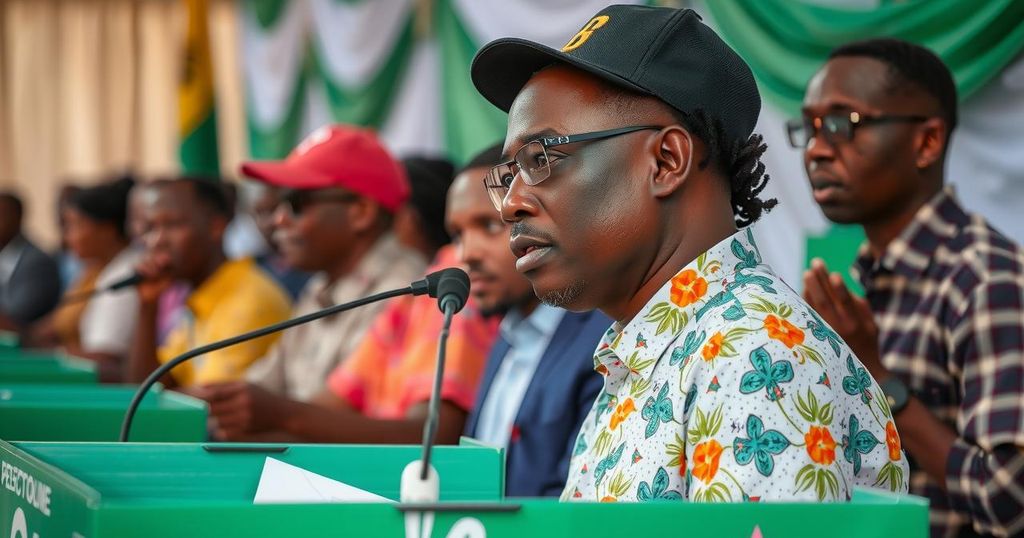Politics
ACCRA, AFRICA, BEDIAKO, CHEDDAR, DEMOCRACY, ELECTORAL PROCESS, GHANA, GOVERNANCE, GOVERNMENT, JOHN TADEN, LOS ANGELES, MAHAMUDU BAWUMIA, NATIONAL DEMOCRATIC CONGRESS, NEW PATRIOTIC PARTY, NORTH AMERICA, NPP NDC, OPPOSITION, PEPPERDINE UNIVERSITY, POLITICS, UNITED STATES, UNIVERSITY OF GHANA, VOA
Jamal Walker
0 Comments
Ghana’s Upcoming Elections: A Battle for Economic Recovery and Change
Ghana’s December 7 elections feature former President John Mahama challenging ruling party candidate Mahamudu Bawumia. Economic recovery post-debt default and dissatisfaction with traditional parties are central themes as the electorate expresses a desire for change. Independent candidate Nana Kwame Bediako appeals to the youth, while current issues such as inflation and illegal mining impact voter sentiment. The election is expected to be highly competitive as Ghana navigates its political landscape.
Ghana is poised for a highly competitive election scheduled for December 7, with former President John Mahama challenging the ruling party candidate, Mahamudu Bawumia. Mahama has pledged to foster a 24-hour business environment to enhance job creation and support the economy’s recovery from the $30 billion debt default that occurred in 2022. Conversely, Bawumia emphasizes his commitment to economic resilience despite the challenges of the post-COVID era and other internal pressures.
Historically, Ghana’s political landscape has been dominated by the National Democratic Congress (NDC) and the New Patriotic Party (NPP), a trend forecasted to continue by political experts. University of Ghana’s senior lecturer, Kwame Asah Asante, noted that “one of them is going to carry the day,” referencing the stark underperformance of minor parties. The electorate is engaged, with many voicing dissatisfaction with the traditional parties, as indicated by undecided voter Angela Ofori: “Since 1992 to this year, we haven’t changed parties… we want [to] change to [a] different party so that we would see more improvements.”
A notable independent candidate emerging in this election is Nana Kwame Bediako, known as Cheddar, who appeals to the youth with his vision of eco-friendly development policies. However, his influence may be limited, primarily positioning him to potentially force a runoff with minimal overall impact.
Amidst these advancements, the deteriorating economic situation remains a pivotal issue; Ghana, the world’s second-largest cocoa producer, is grappling with the repercussions of a $30 billion debt default and rising inflation rates, at one point peaking at 54%. John Taden, an international political economist, highlighted that the economic climate has created sustained protests over illegal mining activities, which are undermining environmental integrity and agricultural viability.
Voting intentions reveal a divide, with some citizens advocating for Mahama’s return given his promise of economic reforms and job creation. Voters like Wisdom Gavor express a pressing desire for change, stating that a 24-hour economy could significantly boost employment opportunities. In contrast, supporters of the NPP commend Bawumia’s digitization policies that aim to modernize governmental processes and enhance job accessibility. Ivan Duke, an NPP voter, noted, “One policy I am very happy about is the digitization policy… making everything more accessible and taking it away from the traditional ways of doing things.”
As the election approaches, Ghana is regarded as a stable democracy amidst regional turmoil. Nonetheless, the competitive nature of this electoral cycle promises a significant showdown between established parties and emerging candidates, with the ultimate outcome remaining uncertain.
Ghana’s electoral history has predominantly witnessed a rivalry between the National Democratic Congress (NDC) and the New Patriotic Party (NPP), with minor parties struggling for significant representation. This context sets the stage for the December 7 elections, where economic recovery and political dissatisfaction could serve as pivotal themes guiding voter choices. The nation faces pressing issues exacerbated by external factors like the COVID-19 pandemic and the war in Ukraine, thus highlighting the economy as a critical issue in the upcoming electoral battle.
In conclusion, Ghana’s impending elections are characterized by fierce competition between established parties and emerging candidates, particularly driven by significant economic challenges facing the nation. As former President Mahama seeks to reclaim leadership with promises of reform for a robust economy, incumbent Vice President Bawumia defends his administration’s initiatives. Ultimately, voter sentiment, shaped by a desire for change or continuity, will likely determine the electoral outcome on December 7, heralding a decisive moment in Ghana’s democratic journey.
Original Source: www.voanews.com




Post Comment